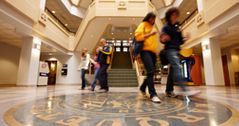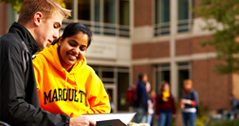Special Programs and Student Resources
The Klingler College of Arts and Sciences is by its very nature the heart of Marquette University. The tie that binds our more than 250 faculty and 30 majors of study is the opportunity for exploration. We'll challenge students to explore many ways of understanding, doing and succeeding – regardless of the major they decide to pursue.
We recognize that as our students are faced with many challenges and opportunities. To assist students in their transition from high school to their college academic career, we offer numerous resources, which we encourage students to use. They will help develop the academic skills that are needed to succeed, as well as introduce students to the many faculty members, advisers and staff members throughout the college that are available to guide them as they discover the value of a liberal arts education.
Academic Success Workshops
The Klingler College of Arts and Sciences Advising Center sponsors a series of workshops to help first-year students achieve academic success. These workshops are offered every semester and focus on such topics as: stress management, major exploration, study skills, test taking techniques and time management.
Advising Center
The Klingler College of Arts and Sciences Advising Center is a team of professional academic advisers committed to serving students and helping them achieve success. This award-winning center offers comprehensive assistance for each student’s development and is open five days a week all year long.
Students are assigned an adviser within days of arriving at Marquette and receive service and support in a wide variety of ways. The advisers can assist students in choosing a major, determining career and academic goals, developing study skills, selecting courses and class schedule, referring them to other campus resources and preparing them for professional school.
College Chaplain
The College of Arts and Sciences Chaplain works to make the mission statement a practical reality by offering a response to pastoral and spiritual inquiry, grief support, student advocacy and representation between academics and Student Affairs and finally education and practice on the spirituality founded by St. Ignatius of Loyola known as Ignatian Spirituality.
The Chaplain can be contacted through the main office of the College of Arts and Sciences or the Office of Campus Ministry found in the Alumni Memorial Union.
Explore the Majors Fair
The Klingler College of Arts and Sciences Advising Center sponsors the annual “Explore the Majors” Fair to encourage and assist freshmen and sophomores who are undecided about their areas of study to explore the many majors and minors in the College. The “Explore the Majors” Fair provides an excellent opportunity for students to discuss majors and minors with faculty representatives, upperclassmen and alumni from every major area in the Klingler College of Arts and Sciences.
First-Year English Program
This program is designed to help students learn to communicate effectively. To that end, the program develops students' reading, writing, speaking and listening skills via critical literacy, which is the ability to express ideas, values and beliefs effectively in a variety of situations. To foster Critical Literacy, the FYE Program offers a two-course writing sequence: ENGL 1001 Rhetoric and Composition 1, Academic Literacy and ENGL 1002 Rhetoric and Composition 2, Public Sphere Literacy.
First-Year Reading Program
Through its faculty participation, the College of Arts and Sciences strongly supports the First-Year Reading Program, a university-wide initiative sponsored by the Manresa Project. Inspired by a desire to bring faculty, administrators and students together outside of a formal classroom, the reading and discussion aim to help students begin the life-long process of finding meaning in their lives. The program encourages all incoming first-year students to read a common text and discuss it with a small group of fellow students, led by a faculty member and student leader, during New Student Orientation in August. Peace like a River by Leif Enger is the ninth book chosen for the program, and was preceded by The Chosen by Chaim Potok (2002), A Hope in the Unseen by Ron Suskind (2003), Bird by Bird by Anne Lamott (2004), A Lesson Before Dying by Earnest J. Gaines (2005), Hunger by Lan Samantha Chang (2006), Bombingham by Anthony Grooms (2007), Run by Ann Patchett (2008) and Persepolis: The Story of a Childhood by Marjane Satrapi (2009).
First-Year Seminar: Introduction to Inquiry
ARSC 1953 First-Year Seminar: Introduction to Inquiry is a one-credit seminar wherein a small group of students (typically 10) meet with their faculty adviser once a week for the first 12 weeks of the fall semester. Students benefit from the two components of the seminar. First, students are encouraged to deepen the intellectual skills required to be successful at the university level. Each course meeting centers on the discussion of a short text, using specific rules of inquiry and dialogue that emphasize argumentation, listening and finding evidence. The second component addresses issues of academic advising and adjustment to university life. Potential topics include course selection, time-management, test taking, life in the dorm, campus resources, socio-emotional adjustment to the move from home, choosing a major, etc. The faculty leader serves as each student's pre-major adviser.
Freshmen Frontier Program
The Freshman Frontier Program (FFP) is designed to expose students to college academics in a gradual way that is meaningful to them. The program begins in the summer before their first term at Marquette with a five-week session on campus when they will take credit and non-credit courses. During the academic year, students will be required to meet at least three times a semester with their FFP academic adviser. Tutors are available when extra help is needed. Students are in the program for a full year, although FFP students are welcome to use the services of the program on a voluntary basis in their remaining years at Marquette.
Honors Program
For more than 40 years, Marquette University has invited its most intellectually talented students to accept the challenge of the Honors Program. The Honors Program provides students with something more for their Marquette experience. When you begin your courses in the Honors Program, you and a small group of your classmates will benefit from the attention and instruction of some of the university’s finest professors. The Honors Program director will work with you throughout your years at Marquette — observing your progress, helping you assemble your curriculum and acting as your resource to intellectual and professional opportunities at Marquette and throughout the city.
Norman H. Ott Memorial Writing Center
The writing center offers one-to-one tutoring to all Marquette students, staff and faculty on all kinds of writing projects, from first year English papers to graduate theses, from history papers to personal statements for law school. The center is staffed with mix of graduate students who usually teach a section of ENGL 1001 Rhetoric and Composition 1 or ENGL 1002 Rhetoric and Composition 2 and undergraduate peer tutors.
McCormick Comm-UNITY
The McCormick Hall Inclusive Leadership CommUNITY is a vibrant, residential-learning community open to all undergraduate students. It has male and female wings and houses 70 residents. Students from minority and majority cultures have an opportunity to interact with and learn from each other in an environment accepting of all people.
Faculty members from the College of Arts and Sciences have actively participated in the Comm-UNITY offering ARSC 1954 The Dynamics of Cross-Cultural Engagement 1 and ARSC 1955 The Dynamics of Cross-Cultural Engagement 2, a two-semester seminar (1.5 credit hours/semester) focusing on cultural diversity that is required of all members of the CommUNITY. Students enhance their knowledge of cultures through readings and attendance at cultural events on campus and within the city. Students develop and cultivate leadership skills through planning and implementing social and educational programs with cultural themes, including dinners, speakers and retreats. Students are encouraged to share their experiences and knowledge through involvement in other student organizations and activities.
Student Organizations and Honors Societies
The Helen Way Klingler College of Arts and Sciences offers students a wide array of co-curricular opportunities to extend the value of their education. Student organizations and honor societies affiliated with the college and/or advised by one of our faculty members include:
Student Organizations
- Air Force Power Booster Club
- Anthropology Club
- Arnold Air Society (Professional Air Force ROTC Service Organization)
- Arts and Sciences Student Council
- Association of Social Welfare and Justice Students
- Campus Crusade for Christ
- Classical Fencing Society
- Criminology & Law Society
- Economics Association
- Gay/Straight Alliance
- International Affairs Society
- Italian Club
- Japanese Club
- Jeannette Kapus Silver Wings Chapter (Professional Organization Supporting the U.S. AirForce)
- Knights of Columbus
- Kuk Sool Won of Marquette
- Le Cercle Francais (French Club)
- Linguistics Club
- Medieval Society
- Muslim Student Association
- Native American Student Association
- Navy Nurse Corps
- Philosophy Club
- Physics Club
- Pre-law Society
- Psychology Students for Diversity
- Writing Society
Honor Societies
- Alpha Epsilon Delta (Pre-health Professions Honor Society)
- Delta Phi Alpha (German Honor Society)
- Eta Sigma Phi (Classics Honor Society)
- Phi Alpha Theta (History Honor Society)
- Phi Sigma Tau (Philosophy Honor Society)
- Pi Delta Phi (French Honor Society)
- Pi Mu Epsilon (Mathematics Honor Society)
- Pi Sigma Alpha (Political Science Honor Society)
- Psi Chi (Psychology Honor Society)
- Sigma Delta Pi (Hispanic Honor Society)
- Sigma Tau Delta (English Honor Society)
- Theta Alpha Kappa (Theology Honor Society)
- Upsilon Pi Epsilon (International Honor Society for the Computing and Information Disciplines)
On this page
- Special Programs and Student Resources
- Academic Success Workshops
- Advising Center
- College Chaplain
- Explore the Majors Fair
- First-Year English Program
- First-Year Reading Program
- First-Year Seminar: Introduction to Inquiry
- Freshmen Frontier Program
- Honors Program
- Norman H. Ott Memorial Writing Center
- McCormick Comm-UNITY
- Student Organizations and Honors Societies
College of Arts and Sciences
- Degrees Offered
- Majors and Minors Offered
- Academic Regulations
- Graduation Requirements
- College Curriculum Requirements
- BA Degree Requirements
- BS Degree Requirements
- Pre-Professional Studies
- Curricula Information
- Arts and Science Special Courses
- Biological Sciences
- Chemistry
- Economics
- English
- Foreign Languages and Literatures
- History
- Interdisciplinary
- Africana Studies
- Applied Mathematical Economics
- Asian Studies Minor
- Broad Field Science
- Broad Field Social Science Minor
- Catholic Studies Minor
- Environmental Ethics Minor
- Ethics Minor
- Family Studies Minor
- International Affairs
- Justice and Peace Minor
- Medieval Studies Minor
- Public History Minor
- Urban Affairs Minor
- Women's and Gender Studies
- Mathematics, Statistics and Computer Science
- Philosophy
- Physics
- Political Science
- Psychology
- Reserve Officers' Training Corps
- Social and Cultural Sciences
- Theology
- Special Programs




 Warning:
Warning:








